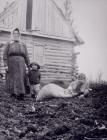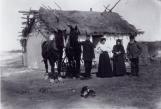1
Anna Bokla, who was born in Insinger, Saskatchewan in 1902 reminisces about her family and her young years on a farm.2
Ukrainian immigrant family in front of their log house1905
Manitoba, Canada
 Credits:
Credits:Manitoba Archives
3
I was born in 1902 in Insinger, Saskatchewan. I have been told that it was in a shack because my parents hadn't built a proper house as yet on their homestead.My maiden name was Anna Maksymiuk. My parents came to Canada in 1900 or in 1901 from the village of Boyanchuk in Bukovyna. My father could neither read nor write. My mother knew how to read and she taught me the alphabet.
It used to be in the early days that my father would leave my mother and the children at home and then walk at least fifty miles to look for work. Sometimes he had to walk as far as Indian Head, which was about eighty miles away. After he had worked for better-off farmers for several seasons, he saved up enough money to buy a pair of horses and only then was he able to begin farming on his own homestead.
There were no other farmers in the immediate vicinity where we lived. Sometimes Indian people would come out of the bush. We were afraid because we thought that they might carry off what little food we had. Once, when I was no more than seven years old, my mother told us to hide under the bed because some Indians were coming our way. She herself hid under the table after having barred the door. They came and looked in through the windows. However, they made no move to come into the house. We were afraid of them because all sorts of unfounded rumours were circulated in those days about the harm that these people might do.
We cultivated a larger acreage each year as we cleared away the trees. In the beginning we worked with oxen, but later we bought a pair of horses and it became easier to do the work. My father had bought the pair of mangy horses from the Indians.
We had to go to Yorkton, about fifty miles away, in order to buy our flour. They also had a flourmill there. We had to cross swamps along the way. There were no graded roads in those days. Sometimes the wagon would get stuck in the swamp and people had to carry the sacks of flour on their backs to keep them dry until the horses pulled the wagon onto dry land. So that no one would make the trip alone, the farmers would go to Yorkton in a group. The food that was brought back was shared by the families. Other farmers would undertake the next trip, and so on. Of course, people didn't bring in large supplies of provisions in those days because they didn't have enough money to buy very much. In the beginning, the farmers drove to Yorkton with oxen and it took a whole week to make the round trip.
There was no school in those parts, but one was finally built when the population had increased sufficiently. For that reason I never went to school; I was already thirteen when one was built. There were six of us of school age in the family. My father let three children go to school and the other three had to stay at home to help with the work on the farm. I was told that I was already too grown up to be wasting my time sitting in school. I think that the real reason why my parents wouldn't send us to school was that we had to be properly clothed and shod, while on the farm it didn't matter how we were dressed.
The school was open only in the spring, summer and autumn. It was closed during the winter because the children weren't able to make it through the deep snow. We ourselves had three and a half miles to go to school. The children not only couldn't make it on foot, they couldn't even be driven to school when the roads were drifted over. The school closed before Christmas and didn't open again until the first of March. There were six grades in the one room.
I couldn't speak English for a long time since I hadn't attended school and my parents and the neighbours spoke Ukrainian. It was only later, after we had moved to Regina that I learned to speak and read English. My mother taught me the Ukrainian alphabet and then I learned to read and write by attending lectures given by Anna Lapchuk at the Ukrainian Labour Temple.
As more Ukrainian farmers settled in our district, they began to get together on Saturdays and Sundays. They were on the friendliest of terms with one another, regardless of whether they had originated in Bukovyna or Galicia. Later the people from Galicia were in the majority. Our neighbours, who lived five miles away from our place, used to visit us, usually on Sundays. My parents were so enthusiastic in their welcome that they would go out and meet them halfway along the road. We children also went out to meet them. People craved companionship and rejoiced in meeting with one another. As I have already said, the nearest neighbour was five miles away.
There were no organized cultural or educational activities in our district in those days. There was only a small Ukrainian Orthodox Church. Sheho, which was twenty-five miles from our district, had more Ukrainian people. A National Home had already been built in that district and the children were taught the Ukrainian language. But it was too far for us to go to Sheho. Our parents wouldn't let us go that far and we had to grow up without the benefit of organizational activities.
Our life became easier as the years went by and my father farmed a whole section of land and had the necessary farm machinery. He even bought an automobile.
I married a poor farmer in 1923 and we moved to Regina. For some time my husband had to go out of town to work on farms. He later found a job in town.
During the economic crisis, my husband was without work. We took an active part in the organization of the unemployed.
ANNA BOKLA
REGINA, SASKATCHEWAN
interview by Peter Krawchuk
4
Ukrainian immigrant family in front of their house1903-1907
Lipton, Saskatchewan, Canada
 Credits:
Credits:Saskatchewan Archives